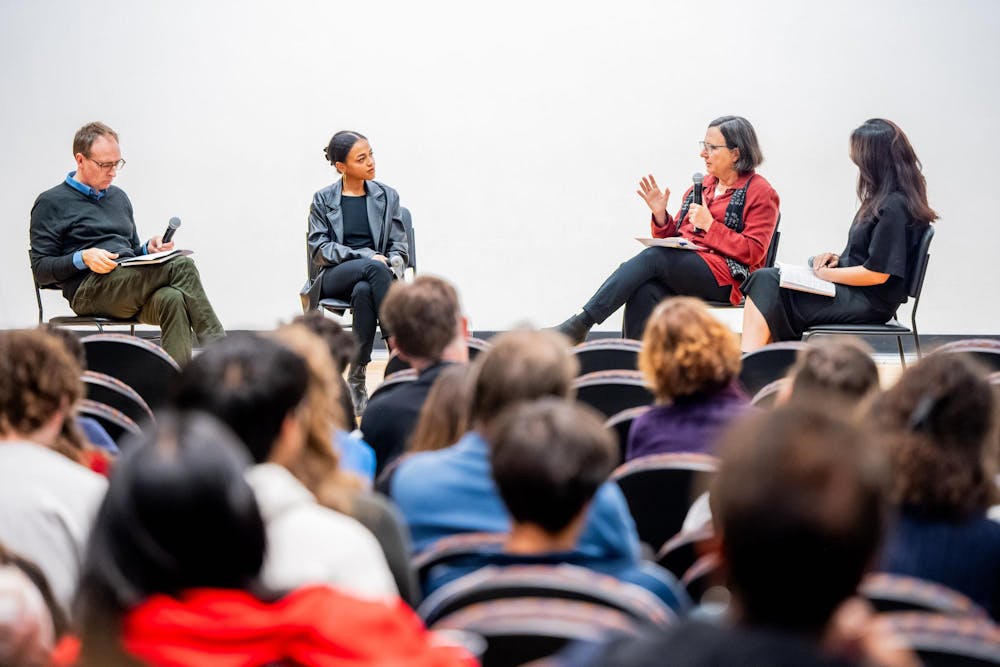The Cogut Institute for the Humanities screened Mati Diop’s acclaimed 2019 film “Atlantique” and hosted an audience discussion at the List Arts Center on Monday. The event, which was the latest installment of Cogut’s Film-Thinking series, kicked off the institute’s fall 2023 screenings.
The Senegalese film, Diop’s feature-length directorial debut, was chosen by Veronica Fitzpatrick, a postdoctoral fellow in Modern Culture and Media. Professor of English and Humanities Timothy Bewes and Professor of Modern Culture and Media Rebecca Schneider, along with Yasmina Price, a PhD student at Yale, accompanied Fitzpatrick in the open-forum discussion following the screening.
“Atlantique” begins at the construction site of a flashy, obstructive tower at the center of Dakar, the capital city of Senegal. Ada (Mame Bineta Sane), the film’s young protagonist, has fallen in love with Souleiman (Ibrahima Traoré), a laborer who works tirelessly on the aforementioned tower without being paid his wage. Her love for Souleiman persists despite her engagement to a wealthy Senegalese businessman.
Early in the film, Souleiman and a band of his coworkers disappear at sea one night when attempting to emigrate to Europe. Before long, an unexplained phenomenon causes those lost at sea to repopulate their former Dakar neighborhood as zombie-esque embodiments of the girlfriends that they left behind. The possessed girlfriends take Dakar by night, demanding that the tower’s wealthy developer pay them the wages their boyfriends were denied for three months.
“I love the double focus of the film,” Bewes said. “This is a film that is about real events and relations that have to do with exploitation and real people’s lives. Mati Diop’s work in general has a social realist component to it.”
“On the other hand, you’ve got this Afro-surrealist, expressionist and formally experimental quality to the film,” he added. “That for me is a very startling element of ‘Atlantique’ and Mati Diop’s cinema in general.”
Jordan Mulkey GS, a PhD student in the Department of Modern Culture and Media, shared similar thoughts on the film: “I am most struck by Diop’s capacity to work across several registers of political and aesthetic concern that attend to the interlocked nature of Blackness, globality and materiality,” he said.
“Atlantique” is characterized by a narrative and political complexity that renders it a challenging film to grapple with. This intricacy has been thoughtfully explored by Price, who was invited to participate in the post-film discussion for her sustained interest in “Atlantique” within the larger context of West African cinema.
“Yasmina Price has a very rich knowledge of West African cinema in general, Senegalese cinema in particular,” Bewes said. “The ways in which we were able to develop a conversation about the historical trajectory of Mati Diop’s work was important.”
As interim director of the Cogut Institute in 2019, Bewes launched the Film-Thinking series to promote conversations about film on campus.
“It began as a way to have conversations about cinema that were not being covered on campus — that is to say, cinema as a mode of thinking,” Bewes said.
The Cogut Institute has hosted a total of nine Film-Thinking events, including Monday’s screening of “Atlantique.” Bewes hopes that in addition to highlighting the work of underrepresented filmmaking traditions, the Film-Thinking series will continue to invite scholars from other universities to partake in future events.
“We hope to continue to bring different voices on campus into the conversation and potential voices from outside of campus, too,” Bewes said. “We’ve often invited guests from other universities to come and speak.”
The next installment of the Film-Thinking series will come in the spring semester. As Bewes announced, Professor of East Asian Studies Lingzhen Wang will present the Chinese New Wave film “Sacrificed Youth.” The screening and discussion will take place on campus in April.
“In screen culture, we all too often forget to take a step back and talk to each other about what we are doing with our screens and what our screens are asking of us,” Schneider said. “What is important is that the Film-Thinking series is a way that we, from different departments, can come together and really think together.”
“The Film-Thinking series makes more clear that we live our lives aesthetically, and aesthetics are central to the way we think about and engage with the world,” Mulkey said. “Film is not just leisure, but allows us to think about something that is implicated in our everyday existence.”





